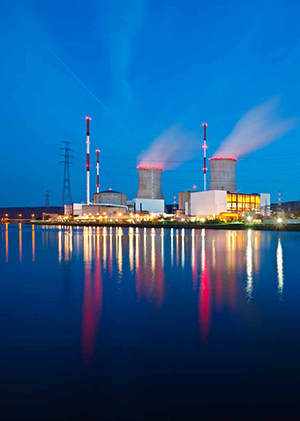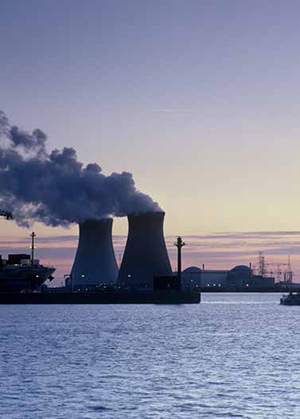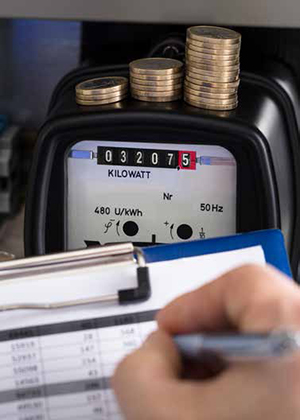Up to you ...
With the collaboration of Serge Dauby - Managing Director
Ing.Christian Hunin MSc. - Expert in radiation protection

1. Security of supply
The consequences and difficulties would be considerable
for security of supply:
Electricity imports will increase, impacting the price level.
New interconnections will have to be built,
The risks of blackout will increase,
The replacement capacities do not exist yet, they will have to be built.
These new capacities will mainly consist of gas plants, which emit more CO2
2. The price
An exit from nuclear power would negatively influence the determining factors directly and indirectly the price of electricity:
The cost of producing electricity will double.
The price of CO could increase tenfold.
The construction of the new interconnections has yet to be budgeted.
The marginal cost of production will shrink.
The cost of natural gas will rise.
The trade balance of our country will deteriorate as a result of rising imports.
The construction of replacement capacities to compensate for the removal of nuclear power plants will entail heavy investments.
 3. The climate 3. The climate
Closing of nuclear power plants will have a negative influence
on the CO2 emissions of our country:
Nuclear energy is the main source of low carbon energy available to Belgium today. At a time when nuclear energy accounts for 90% of low-carbon electricity in Belgium's electricity mix, it is our main asset in meeting climate challenges.
If we choose to replace it with a highly CO (gas-fired) energy source, carbon emissions will inevitably rise.
Therefore, with regard to the share of nuclear energy in the current electricity mix, an output of nuclear power would have adverse consequences on the climate.
4. Security
Our nuclear power plants can be kept in operation for more than 40 years. Indeed :
There is no technical end date that must necessarily lead to a closure.
60 years is the international reference, 80 years the trend more and more widespread.
Belgium has already proven itself in terms of long-term exploitation.
It is urgent to decide on the possible maintenance of nuclear power plants after 2025.
Pursuing the operation of nuclear power plants after 40 years is a political and non-technical choice.
5. Employment
In recent years, Belgium has consolidated a unique competence in the different
applications of nuclear science, technology and industry.
These nuclear skills must be preserved and developed further:
The know-how and expertise of Belgium is a reality,
The maintenance of Belgium as a pole of nuclear knowledge is threatened.
The electricity sector accounts for 1 out of 2 jobs in the nuclear sector,
The nuclear sector is an incubator for innovation.
6. Security
Safety as a top priority for nuclear technology.
The nuclear sector takes its responsibilities:
Nuclear facilities are among the most secure and well-controlled industrial facilities in the world.
The safety culture is part of the sector's DNA and is an absolute prerequisite for the nuclear sector.
From the design of a facility to its operation and the training of all staff members
everything is organized according to safety.
7. Expertise and know-how
Belgian expertise in the nuclear field is a reality:
Belgium has always played a crucial role in the development of nuclear knowledge.
Thanks to its expertise in the many applications of nuclear technology, our country has a solid international reputation and know-how recognized by many countries.
We can not abandon this leading role. Belgium must maintain this area of expertise and continue to strengthen it.
Without a political decision on the continued operation of the plants, there is a risk that these skills and know-how that we have accumulated over the course of history will disappear.
8. Waste
Category A waste: low activity, short life
Category B waste: low activity, long life
Category C waste: high activity, short or long life
This example filters, resins, protective equipment items (clothing, gloves, ...), paper, organic waste, activated concrete, wastewater treatment residues in nuclear power plants or certain waste decommissioning, which have come into contact with substances
In terms of waste volumes:
75% of radioactive waste is of low activity
1% are of high activity
These alone, however, contain 95% of the total activity of radioactive waste, all categories combined.
The rest consists of intermediate level waste.
"The total amount for the management of radioactive waste and the dismantling of all nuclear facilities
in Belgium is estimated at 15 billion euros." BRIGITTE ROGER, ONDRAF
9. World
Countries around the world are relying on nuclear energy to solve their energy challenges:
Countries are turning to nuclear power to secure their supply, stabilize the price of electricity and achieve their climate goals.
2017 was a record year ever nuclear capacity was so high.
The International Energy Agency predicts strong growth in global nuclear capacity by 2040.
In summary:
Nuclear energy is part of the solution to reach our commitments in terms of climate objectives.
Nuclear power and the climate are very complementary in order to enable us to reach our commitments in terms of CO2.
Just listen to the media to realize that more and more voices,
whether scientists or even ecologists are heard to say that we need nuclear power to achieve our climate goals.
Nuclear power is a technology of the future, and in many cases is a vector of innovation
The 2,000 people working on each nuclear site (Tihange & Doel) are nuclear professionals who operate their facilities safely on a daily basis
Without them we can not be sure of finding light by returning home at night. What each of us finds normal, and it must continue like this!
The people working on the nuclear sites are proud to work for this sector, and that's normal, we should reinforce them in this idea rather than launching anxiogenic messages against them
The conclusion :
In case of exit in 2025 security of supply would no longer be guaranteed.
The price of electricity would increase.
CO2 emissions would increase rather than decrease.
Loss of at least 7000 jobs. |
 3. The climate
3. The climate
